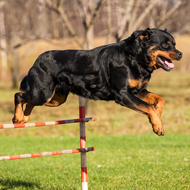
Balance exercises could lower the chance of a ligament tear.
Agility dogs lacking core strength through regular physical activity may be more prone to one of the most prevalent canine knee problems, according to a new study.
Researchers at Washington State University documented the activity and injury odds of some 1,200 agility dogs, and found that those participating in activities like flyball are more at risk of rupturing the cranial cruciate ligament.
Published in BMC Veterinary Research, the study also revealed that dogs spayed before the age of one were almost twice as likely to rupture the ligament, compared to dogs spayed after their first birthday.
Australian shepherds and Labrador retrievers were more than twice as likely to rupture cruciate ligaments, compared to other breeds. Rottweilers and Australian cattle dogs were more than four times as likely to tear the ligament.
Denis Marcellin-Little, a veterinary orthopaedic specialist with the University of California, Davis, believes this could be related to the dog's size, shape, and possibly its tail.
“Larger dogs doing agility tend to be less balanced, so it is not surprising a Rottweiler or Australian Shepherd may be at a higher risk of a rupture compared to smaller breeds,” he said. “The tail could also be a factor; the tail has been proven very important for cheetahs, and you can imagine it has a role to play in the overall balance of the dog.”
In light of their findings, researchers are calling on owners of agility dogs to add balance and core strengthening exercises to their pet’s routine.
Study lead Deb Sellon, a veterinary surgeon at Washington State University, commented:
“Balance exercises, wobble boards, anything that improves the core strength of the dog seemed to lower the odds of a ligament tear. We found fitness matters for dogs just like it does for people, and we haven’t shown that before.”
Besides balance and core strengthening exercises, activities such as dock diving, barn hunt, and scent training are linked to a lower likelihood of ligament rupture.
The study found that while frequent activity, such as swimming or running, did not raise the chance of injury, it also did not decrease it. Surprisingly, dogs that competed in agility competitions more regularly and at higher levels were less likely to rupture their cruciate ligaments.



 The RCVS has announced a new version of its 1CPD mobile app, with enhanced features for veterinary surgeons and veterinary nurses to record their continuing professional development.
The RCVS has announced a new version of its 1CPD mobile app, with enhanced features for veterinary surgeons and veterinary nurses to record their continuing professional development.